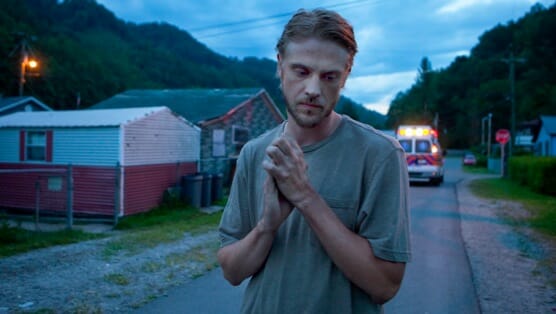
Although the drama Little Accidents is set in a small West Virginia coal-mining town, its broader themes—classism, corporate ethics and personal responsibility—resonate far beyond Appalachia. In her artful feature film debut, writer-director Sara Colangelo deftly avoids the hillbilly stereotypes as well as movie-of-the-week territory with compelling characters who struggle with their own lies and grief.
Coal mining is a dying industry in West Virginia, with jobs lost to mechanization and the once-abundant coal seams running low on ore. The opening scene’s bleak landscape, coupled with a descent into the dark mine shaft, sets the film’s overall tone. Amos Jenkins (Boyd Holbrook) and his coworkers ride into the mine as many have done before; the film then immediately cuts to Amos testifying before a panel of white-collared lawyers and businessmen. We learn that Amos is the sole survivor of a disaster that killed 10 others, and he’s feeling pressure from all sides. The victims’ families hope his testimony will help their class action suit, while the opposing side—which includes the company and miners like his father—insist they can’t survive if the mine closes. Amos says he can’t remember the incident, but he’s also stalling for time as he holds the fate of the company and the town’s residents in his hands.
Set against this polarizing backdrop is the disappearance of teenager J.T. Doyle (Travis Tope). His father, Bill (Josh Lucas), is the executive under fire for neglecting safety conditions at the mine. Bill’s marriage to Diane (Elizabeth Banks), already buckling under stress from the impending lawsuit, is further tested. She finds unlikely solace with Amos, the one person who can ruin her husband and their comfortable, well-appointed lifestyle.
Rounding out the ensemble of characters is J.T.’s classmate Owen (Jacob Lofland), whose father died in the mining accident. Although Owen knows something about J.T.’s whereabouts, he keeps the information to himself to avoid getting in trouble and further upsetting his now-widowed mother (Chloë Sevigny, in a subtle performance). Instead, for a self-imposed penance, Owen fosters a bond with Diane, doing odd jobs around her house and becoming something of a surrogate son. Owen’s own mother can’t understand the newfound relationship between the Doyles and her child, and thinks that Owen simply admires their bourgeois lives.
The mining accident—reminiscent of 2010’s Upper Big Branch Mine tragedy in West Virginia, in which 29 miners died—is only discussed in the past tense. Colangelo wisely avoids dwelling on the accident itself, its immediate aftermath or the fight between the union and mining company. Instead, she turns her focus toward the individual stories, and the grief that envelops the community.
The film’s pacing is slow and deliberate, as if Colangelo were mirroring the speed of life in Appalachia. She’s in no rush to whiz by the kids playing and riding bikes around their trailer homes. The camera also lingers on the lush, yet ominous, green forests of the region and the dirt, mud and soot that follows the miners home. By contrast, the Doyles’ suburban house exterior is a pristine white, and its neatly appointed interiors are stark, uninviting and cold.
As a whole, the cast delivers powerful performances. It’s refreshing to see Banks play a much different character than her recent turn as Effie in The Hunger Games trilogy or in straight-up comedic roles. While her West Virginian accent rings a little false, she’s still able to convey Diane’s pain as a mother who doesn’t know what’s happened to her son, and as a wife whose husband may be responsible for the death of 10 people. In a misstep for Colangelo, J.T.’s disappearance falls too far in the background, and Diane and Bill don’t do enough—or seem desperate enough—to find their son.
Holbrook (Gone Girl, The Skeleton Twins) is superb as the surviving miner, torn between disappointing his father and the mining company, and families who’ve lost loved ones in the accident. His slow recovery from the partial paralysis on one side of his body is believable. What’s harder to accept is the rushed relationship between Diane and Amos. Their affair seems unlikely; not only are they divided by company politics and social status, they begin their no-tell motel trysts after just a few brief exchanges at a Bible study and a convenience store.
While there’s impressive acting by the film’s more seasoned performers, Jacob Lofland offers Little Accidents’ most revelatory performance. Last seen on the big screen as the memorable Neckbone in Mud (2012) with Matthew McConaughey, Lofland runs a gamut of emotions as Owen, from anger to sadness to guilt. There’s a particularly tender and heartbreaking scene in which he cries into the arms of his younger brother, who has Down syndrome, as he tries to slough off the weight of his mistake.
Little Accidents proves a promising start for Colangelo, who’s been nominated for Best First Screenplay at the upcoming Independent Spirit Awards. She illuminates an industry and a part of the country that’s largely forgotten, without passing judgment on her characters’ decisions, both right and wrong.
Director: Sara Colangelo
Writer: Sara Colangelo
Starring: Elizabeth Banks, Boyd Holbrook, Chloë Sevigny, Josh Lucas and Jacob Lofland
Release Date: Jan. 16, 2015 in theaters
Christine N. Ziemba is a Los Angeles-based freelance pop culture writer and regular contributor to Paste. You can follow her on Twitter.